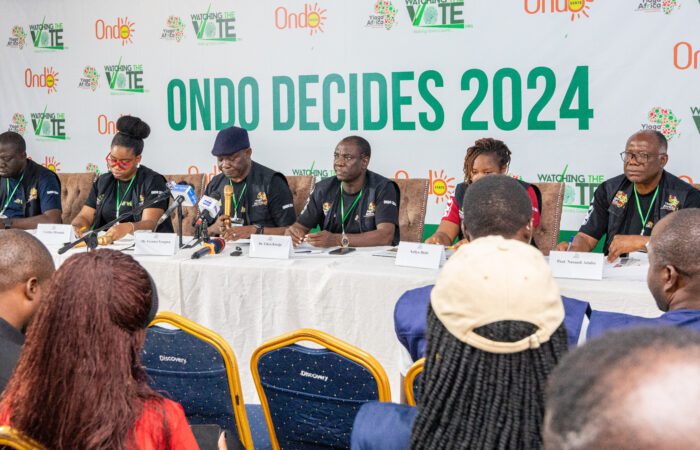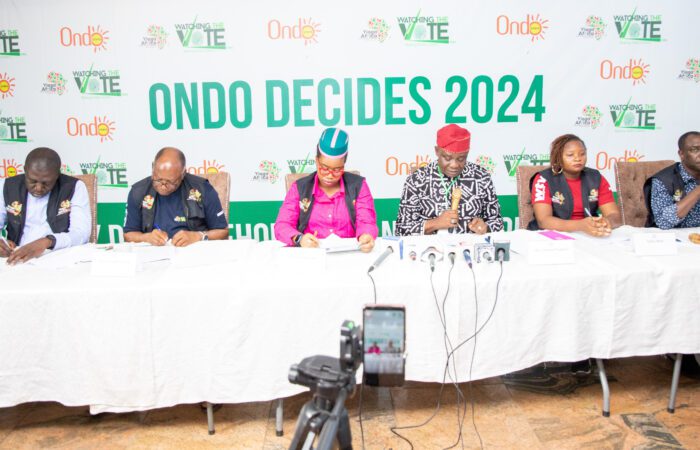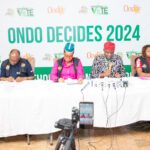As part of preparations towards the July 14, 2018 governorship election in Ekiti State, the Independent National Electoral Commission (INEC) stepped down the ongoing Nationwide Continuous Voters Registration (CVR) exercise to the 177 ward registration centers in the State. This is geared towards ensuring that as many citizen that are eligible, are given the opportunity to register in order to exercise their franchise in the forthcoming election.
YIAGA Africa deployed 24 trained and accredited citizen observers to 41% of the 177 ward registration centers spread across the 16 LGAs in Ekiti State to observe the CVR exercise. Employing the rotational observation model, WTV observers deployed over a three (3) day period; April 11th, 14th and 16th and observed through the day in each of the different wards for each of the three (3) days they observed.
Reports by YIAGA Africa’s WatchingTheVote (WTV) observers indicated that the decentralized CVR exercise was conducted in Ekiti and most especially in the 72 registration centers that WTV visited over the three (3) day observation period. Notwithstanding the delayed commencement on the first day of the registration, the exercise provided the people of Ekiti an opportunity to be registered and by all standards was an improvement from the August 2017 Anambra decentralized CVR exercise. This is evidenced in the findings that all the registrations centers visited were accessible to all and the increase in the deployment of security to registration centers although this was not across board. However, just as the national CVR exercise, political parties are generally not deploying their representatives to observe the process. While there was remarkable improvement in the deployment of security, it was not across board.
YIAGA Africa WTV report observed that the first day of the CVR exercise was plagued with officials and materials arriving late across most of the registration centers, this has become a recurring decimal as it was also observed on the first day of the commencement of the National CVR exercise in April 2017 and on the first day of the decentralized CVR in Anambra in August, 2017. INEC should ensure early deployment of personnel and materials in future exercise.
Impressively, the Direct Data Capture (DDC) machines functioned throughout the day in 96% of the registration centers visited by the last day of the exercise which was an improvement from the first day of the exercise where the DDC machines functioned throughout the day in 75% of the centers. The WTV findings also reveal that it took between 2 to 5 minutes to register a voter using the DDC machines. However, in 33% of the registration centers visited, the INEC officials spent more than 5 minutes to register a prospective voter. This indicates an improvement in the process as against the processing time that can extend to 11minutes for registrants by the DDC machines used for the National CVR. To maintain this positive standard, INEC should upgrade its DDC machines deployed for the national CVR and replace weak and obsolete machines.
As indicated in the WTV findings, the percentage of persons whose fingers were not marked with indelible ink but were allowed to go through the registration process is alarming. As indicated in the WTV findings, on the first day of the exercise INEC officials failed to mark the fingers of registrants in 38% of the registration centers visited and by the last day of the exercise, Ekiti South senatorial district had the highest percentage of registration center’s where the officials failed to mark the fingers of the registrants at 43%. INEC should ensure adherence to the Electoral Act and the CVR guidelines by its personnel, failure of which could open room for abuse of the process or avoidable tensions at the registration centers.
Similarly, the requirement for a form of identification before registration as provided in the Electoral Act was not strictly adhered to in 75% of the registration centers visited as indicated in the WTV findings. The requests for identification was only made in some centers were the officials suspected the registrant was below the age for voting and requested for a birth certificate. The requirement for a form of identification functions to restrict both underage persons and non-Nigerians from registering. INEC should as a matter of enforcement ensure that registration officers demand from the registrants a form of identification as required by the Electoral Law to ensure that registrants are within the eligibility age for registering as a voter in Nigeria and are also Nigerians.
INEC should consider adequate deployment of registration materials in subsequent CVR exercise. WTV Observers reported a combine shortage of registration materials in 25% of registration materials across all the three (3) days observed. Failure to address this issue could lead to diminishing confidence in the ability of INEC to conduct future exercise.
The Commission should extend the time for the exercise from 3pm to 6pm on the days allotted for the CVR exercise to provide more people with the opportunity to register and increase the number of registrants registered daily. This should be considered for the National CVR exercise also.
The inclusion of Saturday’s in the decentralized CVR afforded more citizens the opportunity to register especially for the civil servants and corporate workers who do not have the leisure of time during the weekdays to register. This should also be considered in the ongoing national CVR exercise to ensure these classes of people also have the opportunity to register as voters.
The commission should consider extending the number of days for further State decentralized CVR exercise. There was high demand for registration in Ekiti and chances are, not everyone had the opportunity to be registered which could disenfranchise them from voting during the governorship election.
Security Agencies should also ensure the deployment of officials to all registration centers to ensure safety of personnel and materials as well as curb attempts of intimidation and harassment. They should also ensure sanction for electoral offenders, especially in the LGAs of Ido/Osi and Oye where there are reported incidents of underage voting to serve as deterrent for others.
Just as the national CVR exercise, political parties are generally not deploying their representatives to observe the process. Political Parties should engage the electoral cycle (pre, during and post) by deploying party agents to observe all stages of the electoral process to stave off all forms of manipulations. Political parties have no moral right to interrogate or condemn any electoral process that they did not actively participate in.
For the Citizens, there is also need to take with keen interest matters of their civic responsibilities and serve as watchdogs over the process. Citizens also should exercise restraint and not allow themselves to be used as willing tools to achieve inordinate desires of the politicians.
Civil Society Organization (CSOs) should engage every aspect of the electoral process and intensify efforts in civic and voter education to increase participation in the process and in turn reduce voter apathy.
YIAGA AFRICA WatchingTheVote is a citizen’s-led electoral integrity movement dedicated to the promotion of credible elections through systematic and technology driven observation of elections. In pursuit of its goal of enhancing the quality of elections, YIAGA Africa deploys citizens’ observers to observe the conduct of activities within the electoral cycle.
Signed
Samson Itodo
YIAGA Executive Director






